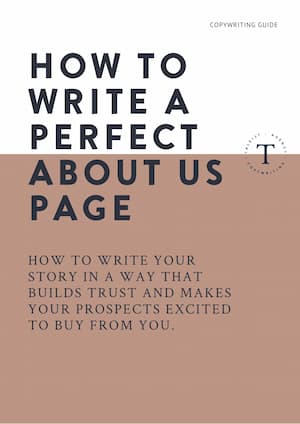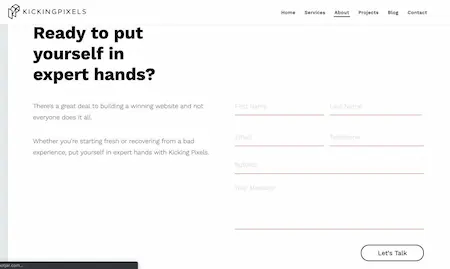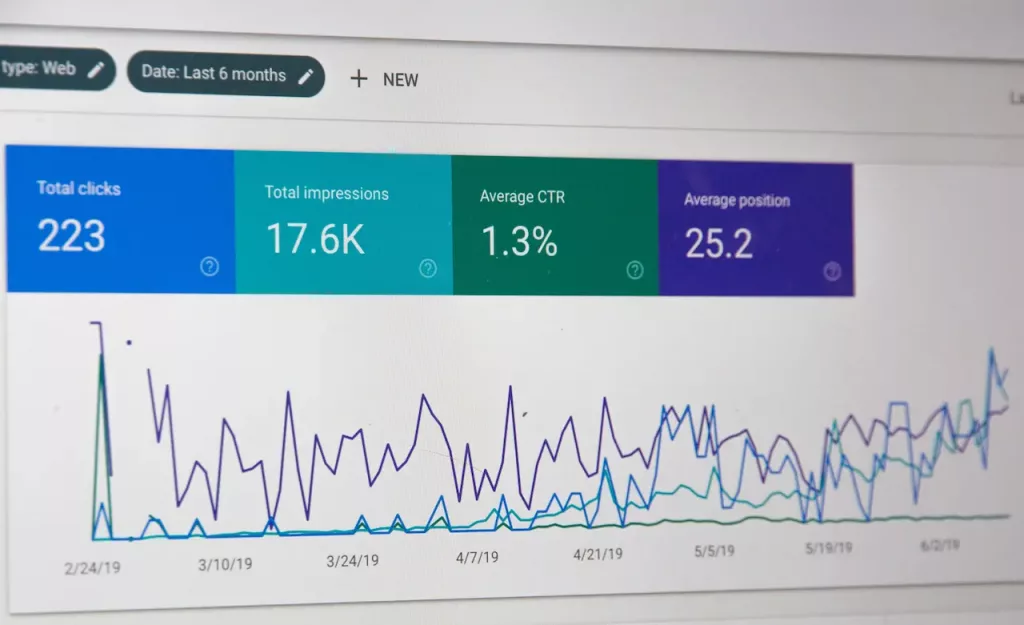The pages every website should have

A global pandemic sped up an already dramatic shift in consumer behaviour. Stay-at-home orders temporarily closed most brick and mortar stores. People spent more time on their phones, buying products from their couches.
You might have been buying products or services online for a long time. However, many people hadn’t made the leap before the pandemic.
Now, almost everyone in your market has experienced researching and buying online. And they’ve been trained in what to expect by the best sites in the world. So your whole business is being judged more than ever on the quality of your website
One of the most important decisions you’ll make when designing a website is what pages to include. It’s not just about web design and content creation.
The number of pages on your site is also integral to search engine rankings. Having the right pages could determine how well your site shows up in search.
So what pages does every small business website need to have? What are the best types of pages for SEO? These questions and more are the subject of this blog post, part of our series of website FAQs.
[toc]
How many pages should a website have?
Every website is different. The optimal number of pages for your site depends on several factors.
First, your website will be accessed by two audiences: humans and search engines. You need to consider both these audiences.
When marketing to your human audience, less is more. Clutter and complexity are enemies of good user experience. Keep things as simple as possible. Make it easy for users by writing short paragraphs, and breaking what you write up with headlines and lists. This gives your visitors the best chance of finding what they need on your website.
And if your human readers don’t need much, you could get away with a single page. However…
Search engines want as much content as possible. If you want the best chance to be noticed by Google, you’ll need at least five to six pages on your site. And that doesn’t include your privacy policy page or conditions page. Those are necessary but they aren’t what we’re talking about.
The pages you do want to see showing up in Google will need enough quality content for Google to believe you’re serious.
The 5 Pages Every Website Needs

When it comes to building a business website, there is no single sitemap. Every business is different, and they all need a website that’s tailored to their customers’ interests.
But no matter what industry you’re in, there are five standard pages every business website should have. These five web pages are…
1. Homepage
Your homepage is like the first date. It’s where all your efforts go into making a good impression. It determines whether or not someone will stick around for more. That’s why every element on your homepage should be crafted with purpose. The purpose is to make that crucial initial connection count.
The homepage of your website needs to be easy and clear for all visitors to understand quickly. In addition to your website copy, your homepage should also include:
Your logo
Contact information
A call to action
Avoid overwhelming your homepage layout with irrelevant images or bright colours. Those things might turn off potential customers. Instead, use simple design concepts that best represent who you are as a business.
But a good-looking homepage is not going to be enough to capture your target audience. Your page needs engaging website copywriting. The website copywriting should highlight what you can do for your target audience.
The goal of your homepage is to offer visitors a glimpse of what can be found in the rest of your site. It’s an opportunity to establish your credibility as a company and build rapport with a potential customer.
About Us page

There is an art to writing the perfect About page. The perfect About page allows you to connect with your audience on a more personal level.
An About Us (or About Me) should include a clear sense of what makes your brand unique. You should say how your customers will benefit from engaging your business.
Storytelling is the cornerstone of any About Us page. It provides a human element to your business. That makes it easier for you to connect with your audience on an emotional level. Sharing your personal journey allows customers to better understand what you do, and why they should care about you or your business.
Products and services page
The products and services page is one of the most important pages on your website. Depending on the scope of your business, you might have one or many.
Get it right and you can turn a first-time visitor into a repeat customer. That’s why you should not take services and product pages for granted when optimising your website’s user experience.
We have a lot of copywriting tips. Here’s one of the best: sell benefits, not features. Craft a story that helps buyers visualise how their lives will be made better with your product or service.
The goal is to make customers feel like they’re already part of the experience before even making the purchase.
Product photography plays an integral role in marketing your products. Consumers are more likely to buy something if they have a better idea of how these products look in real life.
Short videos or high-resolution images that allow customers to zoom in and out will help enhance their user experience even further.
Blog page
Blog posts are a powerful tool to generate interest in your business. You can write blog posts to introduce products, share the latest trends and answer frequently asked questions.
If you’re looking to learn content marketing, you’ll need to understand the power of blogging. You can use your blog to address prospects at different stages in their buying decision process.
And blogging is SEO copywriting 101.
To keep your blog page interesting and fresh, you must provide new content on a regular basis. That should be exciting to you. A blog post is a great way to establish yourself as an industry expert by sharing knowledge with your readers.
Some blogs bombard their readers with product or service promotions. That’s not a recommended strategy if you’re using your blog page to build trust and credibility.
You’ll likely lose customers if your blog is nothing more than a platform for self-promotion. Visitors will quickly grow tired of feeling like they’re reading a sales pitch every time they visit your blog page.
Contact page

The contact page is the customer support service on your website. Having an easy to use contact page allows customers to get in touch quickly.
Your contact page should include personal information like your business’ physical address, email address and phone number. It should also be in a prominent position that’s easy for visitors to find.
Don’t leave visitors guessing about how long it might be until their email gets read. Provide your visitors with an accurate response time. You’ll make it easier for your visitors and help them understand how quickly they can expect a reply from the business.
We have more advice on writing a great Contact Us page.
Is it better to have more or fewer pages on your website?
There’s no easy answer. On the surface, it would seem that websites with more pages and content align with Google’s preferred policies. But that doesn’t always hold true.
Google rewards websites that offer an excellent user experience by providing high-quality content. But websites with irrelevant content or that practise keyword stuffing for SEO purposes will be penalised.
A large website with several high-performing pages typically has higher ranking potential on Google. Google sees these sites as trustworthy. And their user experience is likely to be higher for visitors looking for information. The other pages on the site can also reap the benefits of the increased SEO value through interlinking.
What is an ideal number of pages recommended by Google on any website?

An average website has around 10 to 30 pages, but that’s an average, not the case for everyone. The ideal number of pages for SEO depends on factors such as keywords you’re trying to rank for. If you’re a small business targeting your local community, you can probably get by with around 5 to 10 pages.
Search engines tend to be lenient with websites that have a lot of pages as long as those pages serve their purpose. The trouble starts when you start to inflate the size or content for SEO purposes without adding anything useful. That’s when Google might take notice and penalise your site.
Google’s algorithm has changed to favour usability over keywords. So it is more important than ever before to create quality content that serves its intended user, instead of keyword stuffing for ranking benefits.
Are long pages bad for SEO?
There is a long-held belief that creating a large number of small pages is better for SEO than a single long page about the same topic. But studies have shown that longer content ranks better than short content most of the time.
Google’s goal is to provide users with the best answers to the questions they might have. Longer articles usually offer more information. They answer not just the user’s first question but more of their questions. Therefore, longer pages usually rank higher than shorter ones.
A longer page with quality content will also impact dwell time, which refers to how long visitors stay on your site. The more comprehensive the information provided, the longer users stay on your site. Longer dwell time lets Google know you’re delivering what users are searching for. This prompts the search engine to rank you higher accordingly.
Is a one-page website good for SEO?
A one-page website might seem like a great idea for simplicity’s sake. But from an SEO perspective, single-page websites might actually hurt your search engine rankings. They’re also not as user-friendly compared to multi-page sites, which could lead to decreased conversions. Here’s why…
Lack of keywords
Single-page websites are drastically impacted by keyword ranking. Single-page sites focus on a central topic, which means they can only target a single phrase or term in search queries.
Multi-page websites are great for search engine optimization. That’s because they offer a variety in terms of keywords or phrases to target. This increases the likelihood that any given page will hit on something relevant enough for Google’s algorithm and rank well.
Limited content
Single-page websites are forced to present everything on one page. That limits the amount of content they can provide. That means potential customers may be left with unanswered questions about products and services on the site.
This is frustrating for visitors looking for more specific information. It also prevents you from building trust with potential customers when your website is unable to answer their specific needs.
Loading speed
Graphics, videos and heavy text can easily overtax site servers. This will cause delays in loading time. This problem is exacerbated when all these features are crammed into a single-page website. And if your site takes too long to load, your visitors will get frustrated and leave for another website.
Search engines aren’t fans of sites that take too long to load either. In fact, loading speed is one of the factors taken into consideration when ranking websites. Multi-page websites are designed to load much faster than websites that have their information concentrated on a single page.
You can check out your page load speeds with Google’s own speed testing tool.
Lack of links
SEO is all about links, both internal and external. With only one web page, single-page websites are unable to include many internal links. Like an island, the links on single-page websites only have the ability to bounce around sections of the same page. Meanwhile, external links are ill-advised since they could take visitors away from single-page websites too quickly.
Ensure your business website is working for you
When you’re considering which page to include on your website, it’s best to focus on the ones that will have an impact. Aim for at least five to seven high-quality pages with unique content. That should be more than enough to get a good ranking in Google search engine results for keywords related to your company or products/services offered.
But ultimately, the number of pages on your website is not what you should be focusing on. What matters most is that you are providing both quality and quantity in a way that appeals to all visitors.
